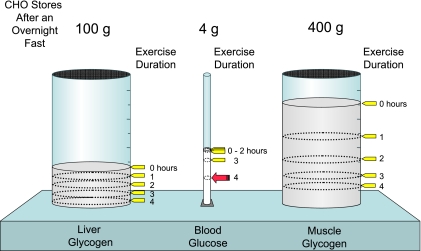Fig. 2.
In the short-term, fasted healthy 70-kg human, liver, and muscle store ∼100 and 400 g glycogen, respectively. Four grams of glucose is present in the blood. During exercise, glucose is preserved at the expense of glycogen reservoirs. Carbohydrate (CHO) oxidation by the working muscle is increased in response to exercise. However, after 1 h, 4 g of glucose is maintained. Blood glucose is maintained at the expense of liver and muscle glycogen. The amount of glucose in the blood can still be constant after 2 h of exercise. Only after exercise of extremely long duration does blood glucose fall to concentrations that result in hypoglycemia severe enough to cause neuroglycopenia.

